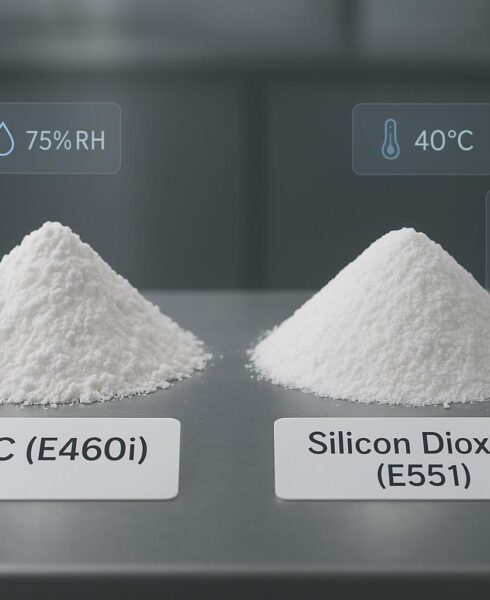You want a magnesium supplement that works quickly. It should be gentle and easy to use every day. Magnesium glycinate powder is special because your body absorbs it better than others. It almost never causes stomach problems. Studies show magnesium glycinate powder has about 80% absorption. Magnesium oxide only has 4% absorption.
Magnesium Supplement | Absorption Rate | Bioavailability |
|---|---|---|
Magnesium Oxide | 4% | Poor |
Magnesium Glycinate | 80% or more | Excellent |
You might sleep better with this powder. You may feel less anxious and have fewer muscle cramps. Many people choose magnesium glycinate powder for its calming effects. It also helps with low magnesium levels. You can change your dose to fit what you need.
Key Takeaways
Magnesium glycinate powder goes into your body better than other types. It is also easy on your stomach. This powder can help you sleep better. It can lower anxiety and stop muscle cramps. It does not usually cause diarrhea or other problems. You can change your dose easily with the powder. You can mix it into drinks to take it. Magnesium glycinate helps your heart, bones, and muscles. It is a good choice to use every day. Doctors often tell people with sensitive stomachs to use magnesium glycinate. They also suggest it for people who need more magnesium in their bodies.
What Is Magnesium Glycinate Powder?

Magnesium glycinate powder is a type of magnesium supplement. It forms when one magnesium ion joins with two glycine molecules. This makes a chelated form called magnesium bisglycinate. The powder mixes well in water, so you can add it to drinks or food. Many people like this powder because it is gentle on the stomach and simple to use every day.
Forms of Magnesium Compared
There are many kinds of magnesium supplements. Each type has its own structure and use. Magnesium bisglycinate is special because it is chelated. The glycine molecules cover the magnesium, which helps your body take it in better. Other types, like magnesium citrate and magnesium oxide, work differently. Magnesium citrate helps with digestion and can help with constipation. Magnesium oxide gives a lot of magnesium, but your body does not absorb much of it.
Feature | Magnesium Glycinate (Bisglycinate) | Magnesium Citrate | Magnesium Oxide |
|---|---|---|---|
Structure | Magnesium + 2 glycine (chelated) | Magnesium + citrate | Magnesium + oxide |
Absorption | High | Good | Low |
Main Use | Digestion, muscle cramps | ||
Side Effects | Rare, gentle | Mild laxative | May cause stomach upset |
Unique Features of Magnesium Glycinate
Magnesium glycinate powder gives you many benefits. Its chelated form helps your body absorb more magnesium. Glycine, found in bisglycinate, calms your nerves and helps your stomach feel better. This makes magnesium glycinate a great choice for better sleep, less stress, and fewer muscle cramps. Magnesium bisglycinate almost never causes stomach problems, so you can use it for a long time. Unlike other types, bisglycinate gives you high absorption and is gentle. You can change the amount you take to fit your needs, so it is easy to use every day.
Tip: If you want a supplement that helps you relax and is gentle on your stomach, magnesium bisglycinate powder is a good choice.
Absorption and Effectiveness
Magnesium Glycinate Bioavailability
If you want your body to use magnesium well, magnesium glycinate powder is a good pick. Your body absorbs this powder easily. Magnesium glycinate is chelated, which means magnesium joins with glycine. This mix helps your body take in magnesium better. The small intestine has a special way to absorb it. The dipeptide transporter moves bisglycinate across the gut wall. This makes magnesium absorption work faster and better.
Magnesium glycinate is chelated, so it goes through your intestines more easily than other types.
Chelation helps magnesium cross the wall of your intestines, so your body uses more of it.
Amino acid-chelated forms like bisglycinate cause fewer stomach problems than magnesium oxide or citrate.
Studies show magnesium glycinate is absorbed well and is gentle on your stomach.
Bisglycinate is a good choice for people with sensitive digestion because of its structure.
Magnesium bisglycinate uses a different way to get absorbed than regular magnesium salts. Most magnesium moves through the distal jejunum and ileum by passive diffusion. Bisglycinate uses a dipeptide transporter instead. This helps your body absorb more magnesium and waste less. About 80% of magnesium from bisglycinate is absorbed within six hours after you take it.
Magnesium Supplements Compared
You might wonder how magnesium glycinate powder compares to other magnesium supplements. Each type has its own absorption rate and amount of elemental magnesium. The table below shows how three common forms compare:
Magnesium Salt | % Elemental Magnesium | Absorption Rate (%) | Effective Elemental Magnesium Absorbed (mg per 100 mg salt) |
|---|---|---|---|
Magnesium Oxide | 60% | 13.8 mg | |
Magnesium Citrate | 11% | 30% | 3.3 mg |
Magnesium Glycinate | 14% | 23% | 3.2 mg |
Magnesium oxide gives you more elemental magnesium per dose, but your body does not absorb much of it. Magnesium citrate absorbs a little better, but it has less magnesium. Magnesium glycinate, or bisglycinate, absorbs about the same as oxide, but it is much gentler on your stomach. You get less elemental magnesium per dose, but you avoid common side effects like diarrhea.
Magnesium bisglycinate is easy for your body to absorb through the small intestine. It works better for raising magnesium levels than forms that do not absorb well, like oxide. Bisglycinate is easier on your stomach, especially if you have a sensitive stomach. Magnesium citrate also absorbs well and helps with constipation, but it is not always the best for daily use.
Both magnesium glycinate and magnesium threonate are organic, chelated forms. They both absorb well, but threonate is used more for brain health. Glycinate is a popular choice for general magnesium supplementation. You can use bisglycinate to help with anxiety, bone health, blood sugar, and PMS symptoms. Doctors often recommend magnesium bisglycinate for people with diabetes or digestive issues.
Note: Magnesium bisglycinate is a great choice if you want a supplement that is gentle, works well, and helps many parts of your health.
Digestive Tolerance and Side Effects
Gentleness of Magnesium Glycinate
You want a magnesium supplement that will not hurt your stomach. Magnesium glycinate powder is gentle and easy to use. Studies show people who take magnesium bisglycinate do not have many stomach problems. In one study, pregnant women took 300 mg of magnesium bisglycinate chelate for four weeks. They did not get more nausea or diarrhea than those who took a fake pill. This means magnesium bisglycinate is safe for your stomach and good for daily use.
Magnesium bisglycinate absorbs well, so your body uses it without pain. You do not need to worry about running to the bathroom or stomach aches. Glycinate, which is in bisglycinate, helps calm your stomach. You can take magnesium glycinate even if your stomach is sensitive. Most people do not feel any side effects from magnesium glycinate, so it is a great choice for long-term use.
Note: If you want to avoid stomach problems, magnesium bisglycinate powder is a smart pick. You can use it every day and not worry about constipation or diarrhea.
Magnesium bisglycinate does not mix with many medicines. You should still talk to your doctor if you take medicines like Synthroid, Ozempic, or zinc sulfate. People with kidney problems or some sugar conditions should not use magnesium bisglycinate. Always ask your doctor before you start new magnesium supplements.
Common Issues with Other Magnesium Forms
Many magnesium supplements can upset your stomach. You may notice these problems if you use magnesium oxide or magnesium citrate. Here are the most common issues:
Diarrhea can happen when you take magnesium oxide or magnesium citrate, especially in big doses.
Stomach pain can happen with these types, making you feel bloated or sick.
You might use magnesium citrate for constipation, but using it too much can make your bowels depend on it. Your bowels may not work well without the supplement.
Rarely, taking too much magnesium can cause hypermagnesemia. This is not common and usually happens with very high doses or using it for a long time.
Magnesium oxide and magnesium citrate work as laxatives. You may pick them if you have trouble with constipation, but they often cause unwanted side effects. Magnesium bisglycinate does not work as a strong laxative. You can use it to help your magnesium levels without worrying about stomach problems.
If you want a supplement that helps with constipation but does not cause diarrhea or stomach pain, magnesium bisglycinate is a better pick. You get the good things from magnesium without harsh side effects. Magnesium bisglycinate powder gives gentle help for your muscles, nerves, and bones.
Practical Benefits of Powder Form

Flexible Dosing
When you use powder, you can control how much you take. Capsules and tablets only give you set amounts. Powder lets you pick the exact dose you need. You can use a scoop or a scale to measure it. This helps you match your dose to your age or health. You can change your dose if your needs change. It is easy to take more or less.
Powder does not limit you to set doses.
You can change your amount to fit your needs.
Scoops and scales help you measure the right amount.
Powder mixes in drinks, so you can change your dose easily.
The chart below shows how much magnesium people need at different ages. This is why being able to change your dose is helpful.

Easy Mixing and Use
You can mix magnesium bisglycinate powder into water or juice. You can also add it to smoothies. This is good if you do not like swallowing pills. Many people think the powder mixes well and does not taste gritty. You can drink your supplement and change your dose if you want. Both liquid and powder are easy to use and let you change your dose. If you want something simple, bisglycinate powder is a good choice.
Tip: If you do not like pills, try mixing bisglycinate powder into your drink.
Suitability for Long-Term Use
Magnesium bisglycinate powder is good for long-term use. It is gentle and does not upset your stomach much. Keep the powder in a cool, dry place away from sunlight. Always close the container after you use it. Do not store it in damp places like bathrooms. Check the powder for any changes in smell or look. Bisglycinate powder helps with sleep, muscles, and stress. You can use it every day and change your dose if you need to.
Aspect | Magnesium Oxide | Magnesium Bisglycinate |
|---|---|---|
Cost | Usually cheap and easy to find | |
Absorption | Does not absorb as well | Absorbs better in your body |
Digestive Tolerance | Can upset your stomach | Easier on your stomach |
Suitability | Good if you want something cheap | Better if you need more magnesium or have a sensitive stomach |
Cost-effectiveness | Good for most people | Best if you need better absorption and fewer side effects |
Who Benefits Most?
Sleep and Relaxation Support
Magnesium supplementation can help you sleep better and feel calm. This mineral helps your nerves slow down at night. It turns on GABA receptors in your brain. These receptors help your mind relax and make it easier to fall asleep. Magnesium also helps your body make melatonin. Melatonin is a hormone that controls when you sleep and wake up. Many people who have trouble sleeping or feel anxious use magnesium to relax and sleep longer. Some studies show older adults fall asleep faster and wake up less at night after taking magnesium. You may also feel less restless and have fewer signs of depression. Doctors often tell people to use magnesium if they want to sleep better.
Muscle Recovery and PMS Relief
If you work out a lot or have sore muscles, magnesium supplementation can help you recover. Magnesium helps your muscles work by letting your cells use calcium and make energy. This can lower cramps and help your muscles heal faster. Studies show athletes and active people who take magnesium feel less tired and recover quicker. Women with PMS may also get help from magnesium bisglycinate. It relaxes smooth muscle tissue, which can make period cramps and anxiety better. Some research says taking magnesium with vitamin B6 can make PMS symptoms less strong. You may feel less pain and discomfort during your period.
Heart and Bone Health
Magnesium supplementation is good for your heart and bones. People who do not get enough magnesium or have health problems that lower magnesium may have a higher chance of heart issues. Studies show magnesium can help lower blood pressure, especially if your blood pressure is hard to control. Magnesium also keeps your bones strong. It works with calcium and vitamin D to build bones and stop breaks. Postmenopausal women, teens, and young men may get stronger bones if they take magnesium often. If you have diabetes, stomach problems, or drink alcohol a lot, you may lose more magnesium and need extra help for your heart and bones.
Tip: If you have trouble sleeping, muscle cramps, PMS, or want to keep your heart and bones healthy, magnesium bisglycinate powder can give you important health benefits.
You get lots of good things from magnesium glycinate powder. The table below shows why this type is special:
Key Advantage | Explanation |
|---|---|
High Bioavailability | Your body takes it in better than other types. |
Reduced Digestive Side Effects | It is less likely to bother your stomach. |
Muscle Relaxation | It helps stop cramps and relaxes your muscles. |
Improved Sleep Quality | It helps you sleep better and feel calm at night. |
Doctors say magnesium glycinate helps with sleep, sore muscles, heart health, and mood.
You should always ask your doctor before you start a new supplement.
FAQ
Can you mix magnesium glycinate powder with any drink?
You can mix magnesium glycinate powder with water, juice, or smoothies. The powder dissolves well and does not change the taste much. You should avoid hot drinks because heat can affect the powder.
How do you know if you need magnesium glycinate powder?
You may need magnesium glycinate powder if you feel tired, have muscle cramps, or trouble sleeping. Your doctor can check your magnesium levels with a blood test.
Does magnesium glycinate powder cause diarrhea?
Magnesium glycinate powder rarely causes diarrhea. Most people find it gentle on the stomach. If you take too much, you may notice mild stomach upset.
Tip: Start with a small dose and increase slowly to avoid side effects.
Is magnesium glycinate powder safe for kids?
Doctors say magnesium glycinate powder is safe for most kids. You should ask your doctor about the right dose for your child. Kids need less magnesium than adults.
Age Group | Recommended Daily Magnesium (mg) |
|---|---|
4–8 years | 130 |
9–13 years | 240 |
Can you take magnesium glycinate powder every day?
You can take magnesium glycinate powder daily. Many people use it long-term for sleep, muscle health, and stress. You should follow the dose on the label or ask your doctor for advice.







